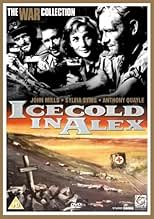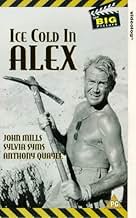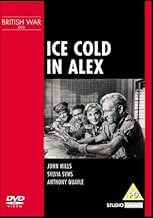Ajouter une intrigue dans votre langueDuring World War II in North Africa, a medical field unit must cross the desert in their ambulance in order to reach the British lines in Alexandria.During World War II in North Africa, a medical field unit must cross the desert in their ambulance in order to reach the British lines in Alexandria.During World War II in North Africa, a medical field unit must cross the desert in their ambulance in order to reach the British lines in Alexandria.
- Réalisation
- Scénario
- Casting principal
- Nomination aux 4 BAFTA Awards
- 1 victoire et 5 nominations au total
- Corporal
- (non crédité)
Avis à la une
The story tells of ambulance corps officer played by John Mills named Captain Anson, whom the war has driven to drink, who is unwillingly ordered to leave besieged Tobruk before the Germans break through and take the strategically important town over. In his ambulance he takes with him two young nurses, along with the stalwart Sergeant Major Tom Pugh played by Harry Andrews, and heads out across the desert for Alexandria in Egypt. Their journey leads them through many obstacles, and along the way they pick up the enigmatic South African army officer, Captain van der Poel (van-der-POO-el he corrects them in his distinctly Afrikaner accent) played by Anthony Quayle, who has become detached from his unit and is looking for a lift. Can they beat the elements of the desert and make it to Alexandria, where Anson knows of a certain bar that serves the ice cold lager he so longs for and promises the others?
In height and build Mills is a much smaller next to big men like Andrews and Quayle, but I was very impressed with how his strong acting and personal inner character make him seem as tall and broad shouldered as the other two. I also admired how the whole cast put their all into the many no doubt very difficult scenes, obviously having to deal with the physically exhaustive work that was asked of them, the tortuous heat and sand fleas nipping at their legs. I could see they were feeling the affects and that adds to the realism of the whole film. Note even the lovely Sylvia Syms as the seemingly unshakable nurse Sister Diana Murdoch, didn't avoid having to look hot, sweaty and bothered like her male co-stars, unlike some Hollywood actresses of that time who I will not even mention. That and the ambulance must have been an oven during the whole shoot.! A truly unique film and worth the whole gripping two hours.
The subplot of the commonality of humanity, together with the final denouement adds to my enjoyment.
As an Englishman living in Australia, I appreciate, especially the final scene in the club. I never fail to relish a glass of beer, or to finger-wipe the condensation on the glass.
(PS I would have made it 10 out of 10 if Miss Syms could have unhooked two more buttons on her shirt)
Anthony Quayle acted his part with perfection, staying both loyal to his own cause, AND to the common cause of survival.
He did not turn anybody over to the German army despite the many opportunities, but turned each incident into an advantage that helped all concerned.
Also the matter of alcoholic addiction was portrayed excellently by John Mills, and the self-realisation which led to his overcoming of the problem was quite poignant.
Overall I would recommend this film as one of the classics amongst war-theme movies. It gets behind the scenes and down to the really important matter of real people and THEIR perspective of things.
I've seen literally dozens of desert survival movies, and didn't expect to see any more that would bring something different to the table. So I was pleasantly surprised by this British war film, as it brings some unexpected turns to the tale. The entire cast has some of their career-best roles, with Quayle and Mills at the head of the class. Director Thompson depicts the oppressive heat of the setting vividly. This is a fairly obscure film in the U. S., and it deserves to be better known. Its initial American release was botched when Fox renamed it Desert Attack and hacked nearly an hour from its running time. Recommended.
Le saviez-vous
- AnecdotesFilmed in Libya, as Egypt was ruled out due to the recent Suez Crisis. Filming began 10 September 1957.
- GaffesIn the very last scene, as Lutz is being driven away from the bar by the British military police, a Land Rover can be seen parked next to the bar. The first Land Rovers were produced in 1948, six years after the battle of Tobruk.
- Citations
Capt. Anson: I'll tell you this, the next drink I have's gonna be a lager. Ice cold. There's a little bar in Alex with a marble top counter and high stools. They serve the best beer in all the middle east. When we get through with this lot I'm gonna buy you one. I'll buy you all one.
- Crédits fousOpening credits prologue: TOBRUK - 1942
- Versions alternativesOriginal British version, "Ice Cold in Alex," runs 130 minutes. U.S. distributor shortened the film in 1961 to 76 minutes and released it as "Desert Attack."
- Bandes originalesMy Old Man (Said Follow the Van)
[uncredited]
Written (1919) by Fred W. Leigh and Charles Collins
Sung by John Mills, Sylvia Syms and Harry Andrews
Meilleurs choix
- How long is Ice Cold in Alex?Alimenté par Alexa
Détails
- Durée2 heures 10 minutes
- Couleur
- Rapport de forme
- 1.66 : 1
Contribuer à cette page





































